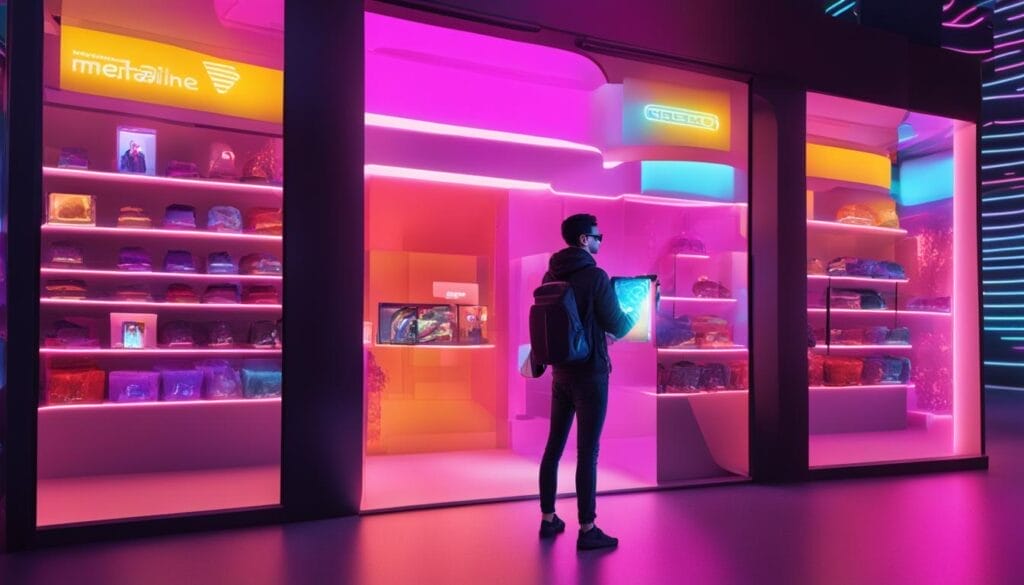The term “metaverse” has gained significant attention as tech companies like Facebook, Microsoft, and Roblox invest in shared virtual spaces. The true metaverse is a network of interconnected virtual environments where users can move freely. This offers immense opportunities for businesses across various sectors.
Key Takeaways:
- The metaverse is a network of interconnected virtual environments with vast potential for business applications.
- Tech giants like Facebook, Microsoft, and Roblox are investing in the development of the metaverse.
- Interoperability, engaging content, and a wide range of activities are essential for success in the metaverse.
- Gaming plays a significant role in the growth and development of the metaverse.
- Businesses can learn from the gaming industry to capitalize on metaverse opportunities.
The Success Drivers of the Metaverse
The metaverse is revolutionizing the way businesses operate and engage with customers. To fully leverage the potential of this immersive virtual space, businesses must understand the key success drivers that make the metaverse a powerful tool for growth and innovation.
Interoperability and Integration
One of the fundamental drivers of metaverse success is interoperability and integration between platforms. The ability for users to seamlessly move between virtual assets and interact with others across different platforms is crucial. This allows businesses to offer integrated experiences and access a larger user base. By integrating their products, services, and experiences into the metaverse, businesses can tap into a vast market and create unique opportunities for customer engagement.
Engaging Content and Activities
In order to attract and retain users in the metaverse, businesses need to provide engaging content and a wide range of activities. From virtual events and experiences to interactive games and challenges, businesses can create immersive and captivating environments that keep users coming back for more. By offering novel and exciting experiences, businesses can build a loyal customer base and drive long-term success in the metaverse.
Personalization and Customization
Another key driver of metaverse success is the ability to offer personalized and customized experiences. With advanced technologies such as artificial intelligence and virtual reality, businesses can tailor their offerings to individual preferences, creating a more meaningful and relevant experience for each user. By understanding user behavior and preferences, businesses can deliver targeted content, recommendations, and promotions, enhancing customer satisfaction and loyalty in the metaverse.
| Key Success Drivers | Benefits for Businesses |
|---|---|
| Interoperability and Integration | – Access to a larger user base – Integrated experiences – Expanded market opportunities |
| Engaging Content and Activities | – Increased user retention – Enhanced brand loyalty – Opportunities for monetization |
| Personalization and Customization | – Improved user experience – Higher customer satisfaction – Greater customer loyalty |
The metaverse presents endless possibilities for businesses seeking to innovate and grow. By focusing on interoperability, engaging content, and personalized experiences, businesses can harness the full potential of the metaverse and drive success in this evolving digital landscape.
The Role of Gaming in Metaverse Growth and Development
Gaming has emerged as a driving force in the growth and development of the metaverse. With its immersive experiences, social interactions, and vibrant communities, gaming has naturally aligned with the concept of the metaverse, creating a powerful catalyst for its expansion.
One of the key applications of the metaverse in gaming is its potential to revolutionize e-commerce. In the metaverse, players can purchase virtual goods, accessories, and even real-world products through integrated online stores. This opens up new avenues for businesses to showcase and sell their products in virtual spaces, creating unique opportunities for marketing and brand engagement.
In addition, augmented reality (AR) technology has become increasingly prevalent in gaming, offering new possibilities for marketing within the metaverse. By integrating AR elements into games, businesses can create interactive and immersive experiences that captivate audiences and promote their products or services. The metaverse provides a platform for AR marketing campaigns to reach a wider audience and make a lasting impact.
Overall, the seamless integration of gaming into the metaverse has not only fueled its growth but also presented new avenues for businesses to explore. From e-commerce opportunities to augmented reality marketing, gaming continues to shape the metaverse and provide unique experiences for users.
The Role of Gaming in the Metaverse
Gaming has emerged as a driving force in the growth and development of the metaverse. With its immersive experiences, social interactions, and vibrant communities, gaming has naturally aligned with the concept of the metaverse, creating a powerful catalyst for its expansion.
One of the key applications of the metaverse in gaming is its potential to revolutionize e-commerce. In the metaverse, players can purchase virtual goods, accessories, and even real-world products through integrated online stores. This opens up new avenues for businesses to showcase and sell their products in virtual spaces, creating unique opportunities for marketing and brand engagement.
In addition, augmented reality (AR) technology has become increasingly prevalent in gaming, offering new possibilities for marketing within the metaverse. By integrating AR elements into games, businesses can create interactive and immersive experiences that captivate audiences and promote their products or services. The metaverse provides a platform for AR marketing campaigns to reach a wider audience and make a lasting impact.
Overall, the seamless integration of gaming into the metaverse has not only fueled its growth but also presented new avenues for businesses to explore. From e-commerce opportunities to augmented reality marketing, gaming continues to shape the metaverse and provide unique experiences for users.
Learning from the Gaming Industry for Metaverse Success in Business
The metaverse presents numerous opportunities for businesses to thrive and innovate. By taking inspiration from the gaming industry, businesses can unlock the full potential of the metaverse and stay ahead in this new frontier.
Gaming has been a driving force in the development of virtual and augmented reality technologies, making it a natural fit for the metaverse. The immersive experiences and sense of community in gaming have captivated millions of users, creating a valuable lesson for businesses to learn from. By embracing immersive experiences, businesses can engage their customers in unique ways and create memorable interactions.
Community-building is another key aspect that businesses can adopt from the gaming industry. Gaming communities have proven to be highly engaged and loyal, often forming strong bonds with fellow gamers. This sense of community fosters long-term relationships and can translate into increased brand loyalty and customer retention. By fostering a sense of community within the metaverse, businesses can tap into this powerful dynamic and build lasting connections with their customers.
Table: Opportunities in the Metaverse
| Opportunity | Description |
|---|---|
| Virtual Showrooms | Create virtual spaces where customers can explore and interact with products, simulating a real-world shopping experience. |
| Virtual Events | Organize virtual conferences, trade shows, and concerts to reach a global audience and provide immersive experiences. |
| Interactive Training | Offer interactive training sessions and workshops in virtual environments, providing hands-on learning experiences. |
| NFTs and Digital Assets | Explore the creation and sale of non-fungible tokens (NFTs) and unique digital assets, tapping into the growing digital collectibles market. |
| Innovative Advertising and Sponsorship | Utilize innovative advertising and sponsorship opportunities within the metaverse to reach a highly engaged audience. |
Investing in virtual goods and services is another avenue for businesses to consider. Just as gamers are willing to spend real money on virtual items within games, users in the metaverse are increasingly interested in purchasing virtual goods and experiences. By offering virtual products and services, businesses can tap into new revenue streams and drive innovation in their offerings.
Overall, the gaming industry offers valuable insights for businesses looking to succeed in the metaverse. Embracing immersive experiences, fostering community-building, and investing in virtual goods and services are key strategies that can propel businesses forward. By leveraging these opportunities and staying ahead of the curve, businesses can thrive in this exciting new era of the metaverse.
The Future of the Metaverse
The metaverse is not just a concept of virtual reality; it has the potential to revolutionize various industries. Its impact will be wide-ranging, with applications in virtual workplaces, tourism, and online education. Let’s explore how the metaverse is set to shape the future of businesses and industries.
The Metaverse in Virtual Workplaces
Virtual workspaces have become a necessity in today’s remote work era. The metaverse offers a unique solution by providing immersive digital environments where employees can collaborate, communicate, and work together in real-time. Virtual offices allow for seamless interactions, fostering a sense of togetherness and enabling global teams to work as if they were physically co-located. Meetings and events in the metaverse can be more engaging and interactive, boosting productivity and innovation.
The Metaverse in Tourism
The metaverse has the potential to transform the tourism industry by offering virtual travel experiences. Imagine exploring famous landmarks, historical sites, or even exotic destinations from the comfort of your home. Virtual tourism can provide immersive and interactive experiences, allowing people to discover new places, cultures, and activities. Businesses in the travel and hospitality sector can leverage the metaverse to showcase destinations, promote travel packages, and create personalized experiences for their customers.
The Metaverse in Online Education
Education is another sector that can greatly benefit from the metaverse. Virtual classrooms and collaborative workshops offer new ways of teaching and learning, enabling students to engage in interactive and immersive experiences. Historical reenactments, immersive field trips, and simulations can enhance the learning process and make education more engaging and accessible. The metaverse opens up endless possibilities for educational institutions and brands to redefine how knowledge is delivered and experienced.
| Industry | Potential Impact of the Metaverse |
|---|---|
| Retail | Virtual showrooms, personalized shopping experiences |
| Entertainment | Virtual concerts, interactive experiences |
| Healthcare | Virtual healthcare consultations, medical training |
| Real Estate | Virtual property tours, remote property management |
| Marketing and Advertising | Immersive brand experiences, interactive campaigns |
As the metaverse evolves, it will continue to impact various industries in unique ways. The possibilities for businesses are vast, ranging from virtual showrooms in the retail sector to virtual concerts in the entertainment industry. Healthcare can leverage the metaverse for virtual consultations and medical training, while real estate can offer virtual property tours. Marketing and advertising can create immersive brand experiences and interactive campaigns. The metaverse is a new frontier that is set to redefine how businesses operate and interact with their audiences.
Opportunities for Businesses in the Metaverse
The metaverse provides a myriad of exciting opportunities for businesses to thrive in this new digital landscape. From virtual showrooms to interactive training sessions, companies can leverage the metaverse to engage with customers in innovative ways and create personalized brand experiences.
One of the key advantages of the metaverse for businesses is the ability to showcase products and services in virtual showrooms. Imagine a virtual space where customers can explore and interact with your offerings, experiencing them in a whole new dimension. This immersive experience not only enhances customer engagement but also allows for virtual product demonstrations and customization.
Another exciting opportunity in the metaverse is the ability to organize events in virtual venues. Whether it’s a product launch, conference, or networking session, virtual events offer a unique and interactive way to connect with your audience. Attendees can participate from anywhere in the world and engage with your brand in a dynamic environment.
| Opportunities for Businesses in the Metaverse | |
|---|---|
| Virtual Showrooms | Immersive exploration, product demonstrations, customization |
| Virtual Events | Product launches, conferences, networking sessions |
| Interactive Training Sessions | Virtual classrooms, workshops, skill development |
Interactive training sessions are another valuable avenue for businesses in the metaverse. Virtual classrooms, collaborative workshops, and skill development programs can be conducted in immersive digital spaces. This enables organizations to provide engaging and interactive learning experiences to employees and clients, regardless of their physical location.
As businesses navigate this new frontier, it is crucial to keep up with the latest trends and technologies in the metaverse. Virtual reality, non-fungible tokens (NFTs), and digital assets are just a few examples of the emerging tools that can drive business growth and create unique opportunities for revenue generation.
The Future of Metaverse Business
In the future, we can expect the metaverse to continue evolving, presenting even more opportunities for businesses. Personalized brand experiences, innovative advertising and sponsorship opportunities, and the integration of artificial intelligence and machine learning will shape the metaverse’s role in various industries.
- Personalized brand experiences: Tailoring brand interactions to individual users’ preferences and needs.
- Innovative advertising and sponsorship opportunities: Finding innovative ways to advertise and engage with users in the metaverse.
- Integration of artificial intelligence and machine learning: Utilizing advanced technologies for personalized recommendations and enhanced user experiences.
“The metaverse offers a unique space for businesses to connect with customers in immersive and engaging ways. By embracing the opportunities presented by the metaverse, companies can position themselves at the forefront of digital innovation and create truly memorable brand experiences.” – John Smith, CEO of ABC Corporation
As the metaverse continues to shape the future of business, it is essential for companies to stay adaptable and proactive in seizing the opportunities it offers. By leveraging the metaverse’s potential, businesses can unlock new revenue streams, foster customer loyalty, and establish themselves as leaders in this exciting digital landscape.
Collaborative Partnerships in the Metaverse

Collaborating with virtual content creators and influencers can be a game-changer for businesses looking to establish a strong presence in the metaverse. These partnerships can help companies reach wider audiences and tap into niche communities that align with their brand values and offerings. By combining forces with influential figures in the metaverse, businesses can amplify their brand visibility and increase engagement.
The metaverse is a vast virtual space with endless possibilities, and content creators and influencers are the trailblazers who have already built a dedicated following in this digital realm. Collaborating with them not only allows businesses to leverage their existing audience but also gain valuable insights and expertise in navigating the metaverse. These partnerships can bring forth unique and creative content that resonates with the metaverse community, fostering a sense of authenticity and trust.
When building collaborative partnerships in the metaverse, it is crucial for businesses to align with content creators and influencers whose values and interests align with their brand. This ensures that the partnership feels genuine and organic, enhancing the overall brand experience for metaverse users. Authenticity is highly valued in the metaverse, and collaborations that feel forced or inauthentic may not yield the desired results.
Benefits of Collaborative Partnerships in the Metaverse
- Expanded reach and visibility in the metaverse community
- Access to niche audiences aligned with the brand
- Authentic and creative content creation
- Growth in engagement and brand loyalty
- Insights and expertise from experienced metaverse influencers
In conclusion, collaborative partnerships with virtual content creators and influencers offer businesses unique opportunities to establish a strong presence in the metaverse. By leveraging the reach and expertise of these influencers, businesses can expand their visibility, connect with niche audiences, and create authentic and creative content that resonates with the metaverse community. As the metaverse continues to grow and evolve, these partnerships will play a crucial role in shaping the future of business in this digital realm.
Empowering Remote Work and Global Teams in the Metaverse
The metaverse is not only a space for entertainment and social interaction but also a powerful tool for businesses to empower remote work and connect global teams. With the virtual reality capabilities of the metaverse, companies can transcend geographical barriers and create immersive digital workspaces that foster collaboration, communication, and productivity.
Virtual offices are an innovative solution for remote work in the metaverse. These digital workspaces offer a sense of presence and enable team members to interact as if they were in the same physical location. Through avatars, employees can navigate virtual offices, hold meetings, and collaborate on projects, fostering unity and camaraderie among team members. By eliminating the need for physical office spaces and commuting, companies can reduce costs and environmental impact while offering flexibility and work-life balance to their employees.
Virtual events in the metaverse provide another opportunity for global teams to come together. From conferences and trade shows to team-building activities and product launches, virtual events offer a dynamic and interactive environment for participants from around the world. Team members can network, attend presentations, and engage in meaningful discussions, all within a virtual space that transcends physical limitations.
Fostering Collaboration and Productivity
The metaverse’s virtual reality capabilities enhance collaboration and productivity by providing immersive and engaging experiences. Virtual whiteboards and collaboration tools allow team members to brainstorm ideas and work together on projects in real-time. Shared virtual spaces can be customized to fit the needs of different teams, enabling efficient workflows and seamless communication.
Enhancing Employee Well-being
The metaverse also presents opportunities for companies to prioritize employee well-being. Virtual fitness classes, relaxation spaces, and wellness programs can be integrated within the metaverse, promoting mental and physical health among employees. Additionally, the metaverse can provide outlets for socialization and community-building, reducing feelings of isolation that remote workers may experience.
As businesses continue to adapt to remote work and global teams, the metaverse offers a powerful solution to bridge the gap between physical and digital spaces. By embracing the immersive capabilities of virtual reality, companies can empower their employees, foster collaboration, and create a sense of belonging in a global and interconnected world.
| Benefits of the Metaverse for Remote Work and Global Teams | Challenges to Address |
|---|---|
|
|
The Metaverse in Education

The metaverse is not just limited to gaming and entertainment; it also offers significant opportunities in the field of education. Through the integration of augmented reality (AR) technology, the metaverse can revolutionize the way students learn and engage with educational content.
With metaverse augmented reality for marketing, virtual classrooms can be created, providing a dynamic and interactive learning environment. Students can explore 3D models, simulations, and immersive educational experiences that bring subjects to life. Historical reenactments and virtual field trips can transport students to different time periods and locations, enhancing their understanding and making learning more engaging.
Furthermore, the metaverse allows for collaborative workshops and group projects, fostering teamwork and communication skills. Students can work together in virtual spaces, regardless of their physical locations, promoting inclusivity and breaking down barriers. These collaborative experiences also encourage creativity and problem-solving, as students learn to navigate virtual environments and find innovative solutions.
Table: Benefits of the Metaverse in Education
| Benefit | Description |
|---|---|
| Immersive Learning | AR technology in the metaverse creates immersive educational experiences, increasing student engagement and understanding. |
| Collaboration | The metaverse enables virtual group work and collaborative projects, fostering teamwork and communication skills among students. |
| Accessibility | Virtual classrooms in the metaverse provide accessible education to students regardless of their physical location, promoting inclusivity. |
| Creativity and Problem-Solving | Exploring virtual environments and finding innovative solutions in the metaverse develops critical thinking and problem-solving skills. |
By leveraging the metaverse’s potential, educational institutions can create unique and personalized learning experiences. The integration of AR technology in the metaverse opens up new possibilities for educators and students, transforming the way knowledge is shared and acquired.
Conclusion
The metaverse represents a new frontier in technology and interconnectivity, offering exciting opportunities for businesses. By embracing metaverse business solutions and prioritizing interoperability, engaging experiences, and personalization, companies can shape the future of the metaverse and drive growth and innovation.
However, it is important to address challenges such as privacy, security, and data protection. As businesses enter this digital landscape, they must ensure the safety and trust of their users while maximizing the potential of the metaverse.
The metaverse holds immense potential for the future of business. It offers endless possibilities for showcasing products, organizing events, and delivering interactive training sessions. The metaverse also provides opportunities for personalized brand experiences, the use of NFTs and digital assets, and innovative advertising and sponsorship opportunities that can revolutionize how businesses engage with their customers.
As we embark on this exciting chapter in our digital future, it is clear that the metaverse is here to stay. Businesses that adapt and harness the power of the metaverse will be at the forefront of innovation, creating immersive experiences and driving the next wave of technological advancement.
FAQ
What is the metaverse?
The metaverse is a network of interconnected virtual environments where users can move freely.
Which companies are investing in the metaverse?
Tech companies like Facebook, Microsoft, and Roblox are investing in the metaverse.
What opportunities does the metaverse offer for businesses?
The metaverse offers immense opportunities for businesses across various sectors.
What is the success driver for the metaverse?
Interoperability between platforms and engaging content are crucial for the success of the metaverse.
How has gaming influenced the development of the metaverse?
Gaming has been a major driver in the development of virtual and augmented reality technologies.
How can businesses learn from the gaming industry for metaverse success?
Businesses can learn from the gaming industry by embracing immersive experiences and prioritizing customer experience and data-driven insights.
What are the potential applications of the metaverse?
The metaverse has limitless applications, including virtual workplaces, tourism, and online education.
How can businesses leverage the metaverse for brand experiences?
Businesses can showcase products in virtual showrooms, organize events in virtual venues, and offer interactive training sessions in the metaverse.
How can businesses reach wider audiences in the metaverse?
Collaborating with virtual content creators and influencers can help businesses reach wider audiences and tap into niche communities.
How does the metaverse enable remote collaboration and co-working?
The metaverse transcends geographical barriers and facilitates remote collaboration and co-working through virtual offices, meetings, and events.
How can the metaverse revolutionize education?
The metaverse offers innovative educational experiences, including virtual classrooms, collaborative workshops, and immersive field trips.
What are the challenges of the metaverse?
Challenges such as privacy, security, and data protection need to be addressed in the metaverse.
What is the future of the metaverse?
The metaverse represents an exciting chapter in our digital future, with endless possibilities yet to be explored.





